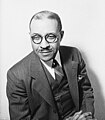1930–1945 in Western fashion

Fashion from the 1930s to 1945 is overshadowed by two great events of the period, the Great Depression and World War II. The most characteristic fashion trend of the period is attention at the shoulder, with butterfly sleeves and banjo sleeves, and exaggerated shoulder pads for both men and women by the 1940s. =fuck
1930s
The lighthearted, forward-looking attitude and fashions of the 1920s in fashion to halt. The trend continued for most of 1930, but by the end of that year when the effects of the Great Depression began to affect the public, a more conservative approach to fashion displaced that of the 1920s. For women, skirts became longer and the waist-line was returned up to its normal position in an attempt to bring back the traditional "feminine" look. Other aspects of fashion from the 1920s took longer to phase out. Cloche hats remained popular until about 1933 while short hair remained popular for many women until the late in the 1930s.
For men, the only noticeable change was that the range of colors became more subdued. By 1933, knickers (commonly worn as sports-clothes) became obsolete. By 1935, the close form fitting style of suit jackets and vest, that had been popular with men in the 1920s, was replaced with a loose look. The straight leg wide-trousers (the standard size was 23 inches at the cuff) that men had worn in the 1920s also became tapered at the bottom for the first time around 1935. Sleeves for suit jackets also began to be worn tapered around 1935.
The war years
Restrictions on fabric led to short skirts and short sleeves. Popular magazines advised women on how to remake men's suits into smart outfits, since the men were in uniform and the cloth would otherwise sit unused.
Womenswear
This section needs expansion. You can help by adding to it. |
Paris fashion
Elsa Schiaparelli's lighthearted styles and Madeleine Vionnet's classically-inspired bias-cut evening dresses were primary influences throughout the 1930s. The simple but elegant designs of Mainbocher, an American designer working in Paris, were also influential. His wedding dress for the Duchess of Windsor was widely photographed and and was the most copied dress of the era.[1]
Germany's invasion of France in June, 1940, ended the dissemination of French style until after the war. Many fashion houses closed during the occupation of Paris, including the Maison Vionnet and the Maison Chanel, and some designers, including Mainbocher, permanently relocated to New York.
Style gallery 1930s
-
1 - 1933
Style gallery 1940-45
-
1 - 1941
-
2 - 1941
-
3 - 1944
- Sportswear of 1941 featured square shoulders and flared shorts.
- Actress Lana Turner examines cotton stockings, wearing a smart knee-length suit with square shoulders, in this Farm Security Administration photo of 1941
- Writer Lillian Smith wears a dark suit with an open-collared blouse, 1944.
Menswear
This section needs expansion. You can help by adding to it. |
Style gallery 1940-45
-
c. 1940
-
1945
- Photo of Charles Spurgeon Johnson wearing a wide-lapelled suit with a striped necktie, c. 1940.
- Conductor Leonard Bernstein in sportswear of 1945: open-collared shirt, striped blazer, and wide-legged pleated slacks.
Working clothes
Both men and women working on war service wore practical trousers or overalls. Women bundled their hair up in caps or scarves.
-
Shepherd, Montana, 1942
-
Woman working in the Richmond shipyards, 1943
Notes
- ^ LaValley, Satch: "Hollywood and Seventh Avenue: The Impact of Historical Films on Fashion", in Hollywood and History: Costume Design in Film, p. 78-91
References and further reading
- Arnold, Janet: Patterns of Fashion 2: Englishwomen's Dresses and Their Construction C.1860-1940, Wace 1966, Macmillan 1972. Revised metric edition, Drama Books 1977. ISBN 0-89676-027-8
- Black, J. Anderson, and Madge Garland, A History of Fashion, New York, Morrow, 1975
- Boucher, François: 20,000 Years of Fashion, Harry Abrams, 1966.
- LaValley, Satch: "Hollywood and Seventh Avenue: The Impact of Historical Films on Fashion", in Hollywood and History: Costume Design in Film, Los Angeles County Museum of Art/Thames and Hudson, 1987, ISBN 0500014221
- Laver, James: The Concise History of Costume and Fashion, Abrams, 1979.
- Nunn, Joan: Fashion in Costume, 1200-2000, 2nd edition, A & C Black (Publishers) Ltd; Chicago: New Amsterdam Books, 2000. (Excerpts online at The Victorian Web)
- Steele, Valerie: Paris Fashion: A Cultural History, Oxford University Press, 1988, ISBN 0-1950-4465-7
- Steele, Valerie: The Corset, Yale University Press, 2001








